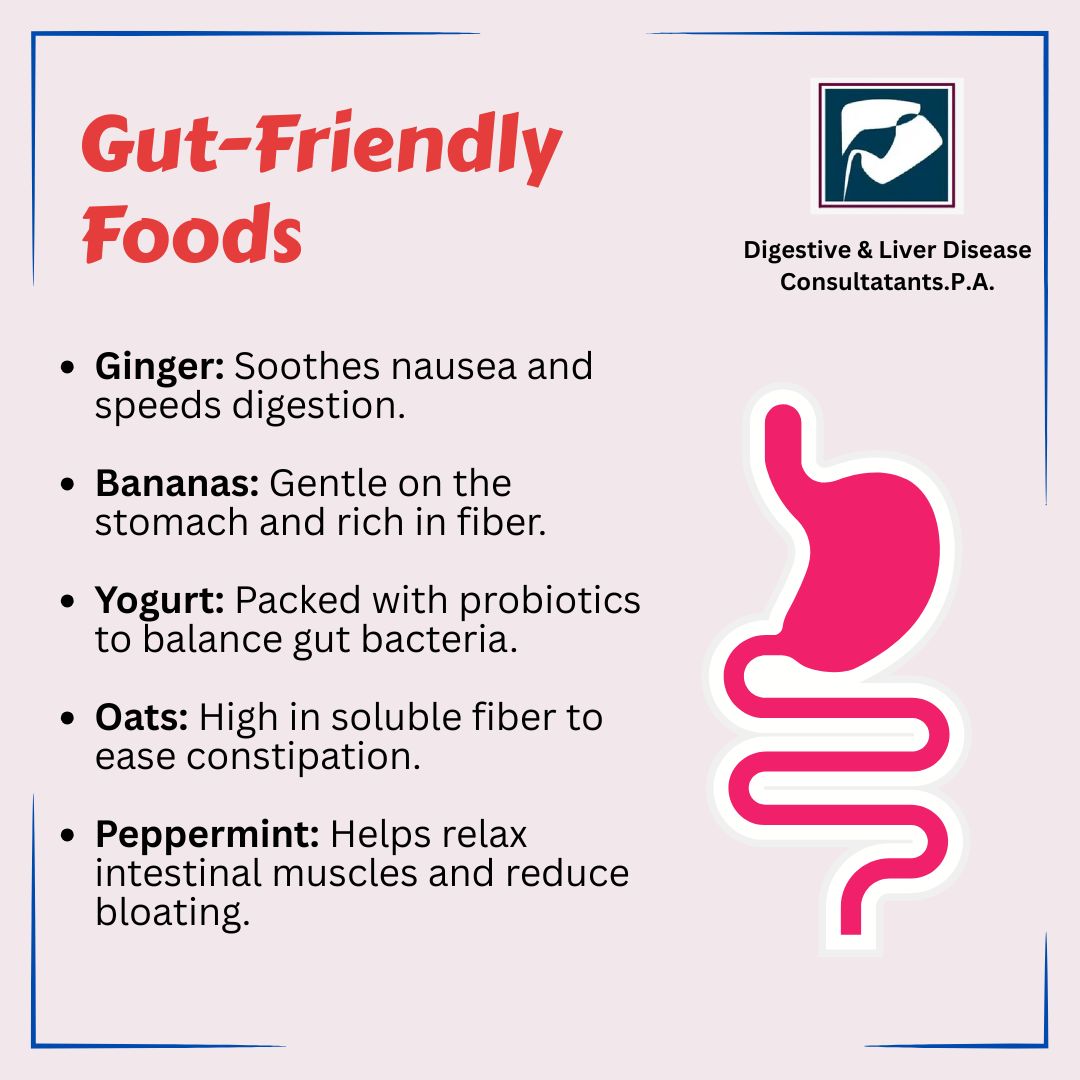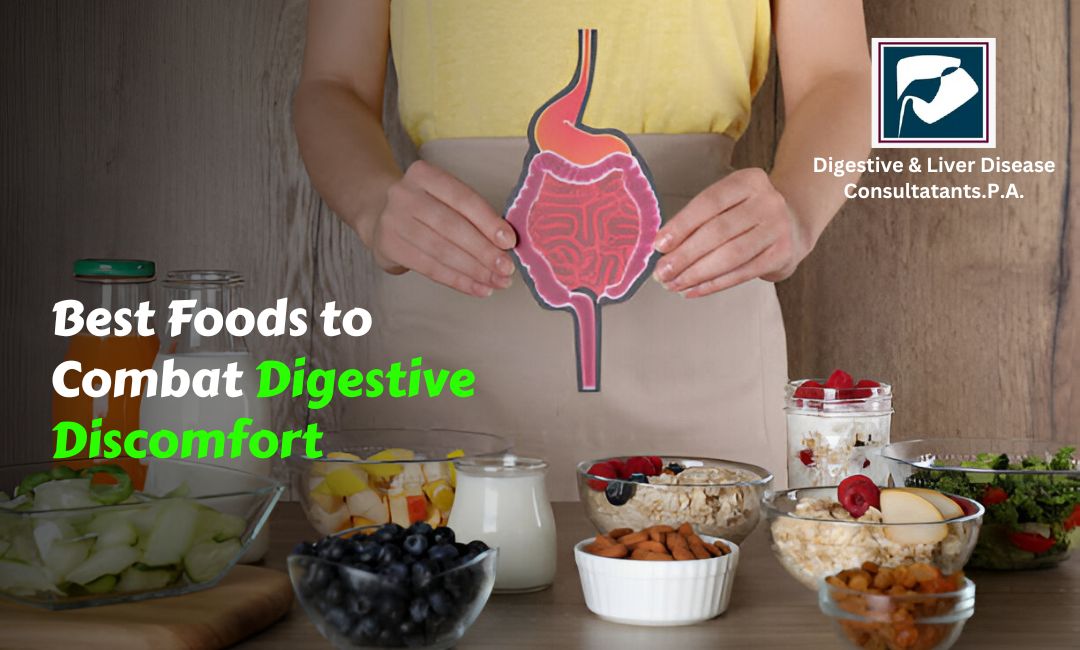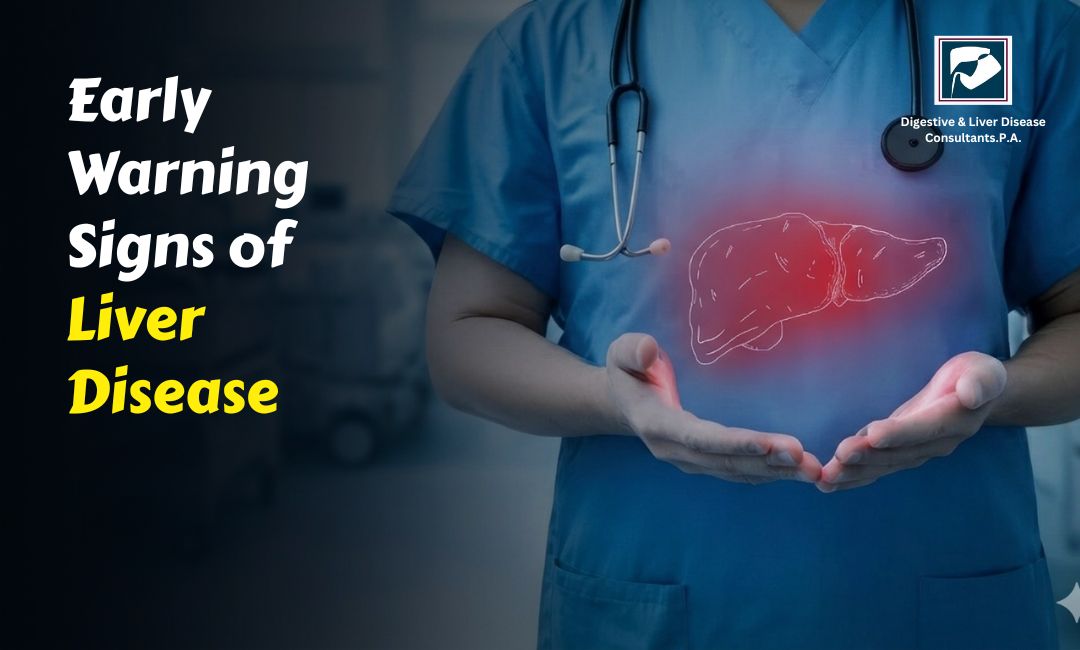Whether it’s bloating, gas, constipation, acid reflux, or general stomach discomfort, your digestive system sends clear signals when something isn’t quite right. The good news? Relief often starts on your plate.
At Digestive & Liver Disease Consultants, P.A., we believe in a food-first approach to improving gut health. In this blog, we’ll explore the best foods to combat digestive discomfort, offering natural, gut-friendly solutions backed by science and trusted by digestive health experts.
Why Diet Matters for Digestive Health
Your digestive system is responsible for breaking down food, absorbing nutrients, and eliminating waste. When it’s out of balance, symptoms like bloating, gas, indigestion, and constipation can make everyday life uncomfortable.
Thankfully, choosing the right foods for digestion can support a smoother process, restore balance, and reduce symptoms naturally. Here’s how.

1. Probiotic Foods: Restore Gut Balance
Probiotics are beneficial bacteria that support a healthy gut microbiome—crucial for digestion and immune function. They are known to:
- Improve symptoms of irritable bowel syndrome (IBS)
- Help reduce bloating and gas
- Support regular bowel movements
- Best probiotic foods:
- Yogurt with live cultures
- Kefir (fermented milk drink)
- Sauerkraut and kimchi
- Miso and tempeh
- Kombucha (in moderation)
These are some of the best foods for gut health, helping to restore good bacteria and ease discomfort.
2. Fiber-Rich Foods: Keep Things Moving
Fiber is essential for maintaining regularity and preventing constipation. It also feeds your gut bacteria and helps reduce inflammation.
There are two types of fiber:
- Soluble fiber: Slows digestion and helps with diarrhea
- Insoluble fiber: Adds bulk to stool and relieves constipation
Top fiber-rich foods:
- Oats
- Chia seeds and flaxseeds
- Lentils and beans
- Apples and pears (with skin)
- Leafy greens and carrots
If you’re struggling with constipation, these are the best foods that ease constipation naturally.
3. Anti-Bloating Foods: Say Goodbye to Gas
Feeling puffy or gassy after meals? That’s your gut reacting to food, hormones, or swallowed air. Eating anti-bloating foods can reduce excess gas and ease pressure.
Foods that reduce gas and bloating:
- Cucumber: High water content soothes inflammation
- Bananas: Rich in potassium, helps prevent water retention
- Ginger: A natural carminative that calms the stomach
- Papaya: Contains enzymes like papain to improve digestion
- Peppermint: Relaxes intestinal muscles, easing cramps and bloating
Avoid carbonated drinks, chewing gum, and overly processed foods to reduce swallowed air and fermentation in the gut.
4. Soothing Foods for Stomach Pain
If your stomach feels tender or inflamed, try gentle, soothing foods for stomach relief.
Top choices:
- Plain rice or rice water
- Bone broth (collagen-rich and easy to digest)
- Mashed potatoes (boiled, not fried)
- Applesauce
- Toast (plain and fiber-light)
These foods are easy on the digestive tract and ideal during stomach upsets, food poisoning, or after a GI procedure.
5. Foods for Acid Reflux and Indigestion
Acid reflux and indigestion often occur when stomach acid flows upward, causing heartburn and discomfort.
Best foods for acid reflux and indigestion:
- Oatmeal: Absorbs acid and provides fiber
- Ginger tea: Calms the stomach and speeds digestion
- Melons and bananas: Low-acid fruits that are gentle on the stomach
- Lean proteins: Chicken, turkey, and fish (grilled or baked)
- Vegetables: Especially green beans, broccoli, and zucchini
Avoid trigger foods like citrus fruits, tomatoes, fried foods, chocolate, and caffeine for better control.
6. Natural Remedies for Digestion
Simple natural solutions can go a long way in aiding healthy digestion:
- Warm lemon water in the morning stimulates digestive enzymes
- Apple cider vinegar (diluted) may help increase stomach acid in low-acid cases
- Herbal teas like chamomile and fennel relax the GI muscles
- Turmeric reduces inflammation in the digestive tract
These natural remedies for digestion can be part of your daily routine for better gut wellness.
7. Healthy Digestion Tips Beyond Food
Food is crucial, but so are your daily habits. To truly support your digestive system, try these healthy digestion tips:
- Eat slowly: Chewing properly prevents overeating and reduces gas
- Stay hydrated: Water helps move fiber and waste through your system
- Move regularly: Walking after meals aids digestion
- Manage stress: Stress impacts gut function—consider yoga or deep breathing
- Avoid overeating: Large meals stress the stomach and cause bloating
Consistency is key. Even small changes can make a big difference in your digestion.
Why Choose Digestive & Liver Disease Consultants, P.A.?
At Digestive & Liver Disease Consultants, P.A., we’re dedicated to helping patients in Texas and beyond overcome digestive issues with personalized care. Our experienced team of board-certified gastroenterologists offers:
- Advanced diagnostic tools (including endoscopy and colonoscopy)
- Expert treatment for conditions like IBS, acid reflux, IBD, liver disease, and more
- Nutritional guidance and lifestyle recommendations
- A patient-first approach in a comfortable, state-of-the-art setting
Whether you're experiencing chronic bloating or occasional indigestion, we're here to help you find lasting relief.
Conclusion: Nourish Your Gut, Heal from Within
Digestive discomfort doesn’t have to be part of your daily life. By incorporating the best foods for bloating, gas, constipation, and acid reflux, and following healthy habits, you can take control of your gut health naturally.
Healing starts with the right choices—and it’s never too late to start.
If you’re struggling with ongoing digestive discomfort, it’s important to consult our best gastroenterologist. At Digestive & Liver Disease Consultants, P.A., our specialists are here to provide expert care tailored to your unique needs. Schedule an appointment today and start your journey toward better digestive health.











